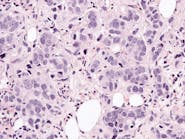A drug known as modakafusp alfa has shown early potential in combating multiple myeloma, a form of bone marrow cancer, in a study presented by researchers from the University of Pennsylvania’s Abramson Cancer Center at the 2022 American Society of Hematology (ASH) Annual Meeting (Abstract 565).
Patients in the Phase I/II multicenter trial (NCT03215030) receiving 1.5 milligrams of modakafusp every four weeks, 43 percent saw a partial response, or a decrease in their cancer by over 50 percent. Patients enrolled in the study had received at least three prior lines of treatment and had their disease relapsed or stopped responding following the previous therapy.
Modakafusp (developed by Takeda Pharmaceuticals) is fusion protein that targets interferon (a pro-inflammatory hormone that is also used for treating viral infections and other cancers) to cells that have CD38, a surface marker present on myeloma cells and a variety of immune cells.
Preliminary results from the study were presented during the 2021 ASH Annual Meeting. The final safety and efficacy results presented this year confirm the drug has a manageable side effects and produces strong anti-myeloma responses.
Most patients (87 percent) on the study experienced treatment-related adverse events, as expected for this heavily pre-treated population. The most common side effects among study participants included neutropenia, or a decrease in white blood cells and thrombocytopenia, or low blood platelet count; and about one third of patients had mild reactions after infusion of the medication.





